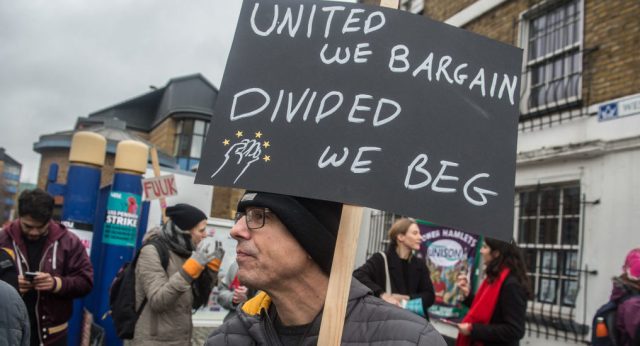Credit: Guy Smallman/Getty

It’s not every day a Tory chancellor gives a press conference in which he stresses (four times by my reckoning) that he is keen to meet with trade unions as a matter of urgency in order to devise a plan to protect jobs and wages. And when he is flanked by a prime minister who hitherto has hardly seen fit to give trade unions the time of day, the spectacle is stranger still. These, though, are not ordinary times.
The acute hardship facing millions upon whose labour our nation depends must be seen as high a priority as shielding the vulnerable from the coronavirus itself. The unions must get stuck in to the discussions — and fast.
The context of these talks will be unique to all the main players. Union leaders will know that their leverage is limited — plainly none of them will be threatening industrial action if they don’t get their way — so there will no place for idle threats. Constructive dialogue and persuasive argument must be the way.
Meanwhile, the Government’s decision to provide much of its multi-billion pounds rescue package in the form of loans means that many business owners, unwilling to saddle themselves with future debt, may simply decide to battle on against the odds. The risk of mass business failures and interruptions, therefore, remains high.
So the unions must, as a first concern, seek an agreement that the Government underwrite the wages of any employee who is either laid off or unable to work through having contracted the virus (or has self-isolated). The same must be sought for anyone who, as a consequence of school closures, finds themselves in the unavoidable position of having to take leave from work to look after children. Ensuring that workers are not compelled to choose between wages, health and childcare must be paramount.
In Austria, Norway and Denmark, tripartite negotiations between government, unions and employers have resulted in agreements on substantial wage support for workers in financial difficulty as a consequence of the virus. There is no reason why the UK should not seek to emulate any appropriate elements, even though these countries’ employment and social security arrangements will be different.
But if that proves unachievable, unions must at the very least demand the government increase the Statutory Sick Pay rate (at £94.25-per-week, it is miserly) and expand eligibility to all workers, regardless of their employment status, who don’t currently qualify for the payment.
Crucially, the unions must insist the discussions go beyond narrow industrial bargaining and seek to protect workers in other ways. The Government’s mortgage holiday initiative should be extended to other areas, such as council tax, energy and water bills. Renters must also be shielded. Additionally, unions should make the case for nationalisation of any strategically important concern whose collapse would carry catastrophic consequences for a particular industry or community.
For their part, unions must, in the task of wresting from the government as many concessions as possible, be prepared to demonstrate some goodwill. The Communication Workers’ Union, for example, has withdrawn the threat of immediate strike action by postal workers and instead offered them up as an emergency service to the nation during the crisis.
It would be remiss of the unions, while they have the Chancellor’s ear, not to make the broader argument about the impact of austerity on public services and those who work in them — something that was not sufficiently addressed in the budget — and, critically, what macroeconomic measures will be necessary to stave off economic collapse once the immediate crisis has passed. While a significant fiscal stimulus, something greater than that pledged by the Chancellor in his budget, will almost certainly be necessary to prevent the economy going south, there is a danger, in purely public health terms, in deploying it too soon, and encouraging physical and economic activity at the very moment the virus is at its most infectious and we are being placed in lockdown.
The focus must therefore be on immediate cash flow injections designed specifically to keep businesses and households afloat, and then, as the country exits the health crisis, measures — which may include so-called helicopter money, tax cuts or increased benefit payments — to compensate for the inevitable (and potentially chronic) lack of demand in the economy. In other words, urgent liquidity now to keep blood flowing through the veins of the patient and then, only when he is fit enough, an exercise regime in the form of substantial fiscal stimulus to restore him to full health.
In any event, the response must be something far more radical than that which followed the global financial crash, when we saw eye-watering bailouts (albeit necessary ones) to the very institutions which created the mess, some poorly-targeted quantitative easing and then a decade of crippling (and literally counter-productive) austerity. The Tories should consider the wisdom and consequences of any strategy in which ordinary working-class voters bear the brunt of any downturn.
More broadly, the philosophy that a global economy administered by bankers, business chiefs and technocrats with an almost blind faith in market outcomes is best for humanity must now be confronted head on. It has, once more, taken a crisis to demonstrate that government still matters, nation states still matter and — crucially — public provision still matters. It’s time now for trade unions to show that they still matter too.










Join the discussion
Join like minded readers that support our journalism by becoming a paid subscriber
To join the discussion in the comments, become a paid subscriber.
Join like minded readers that support our journalism, read unlimited articles and enjoy other subscriber-only benefits.
Subscribe